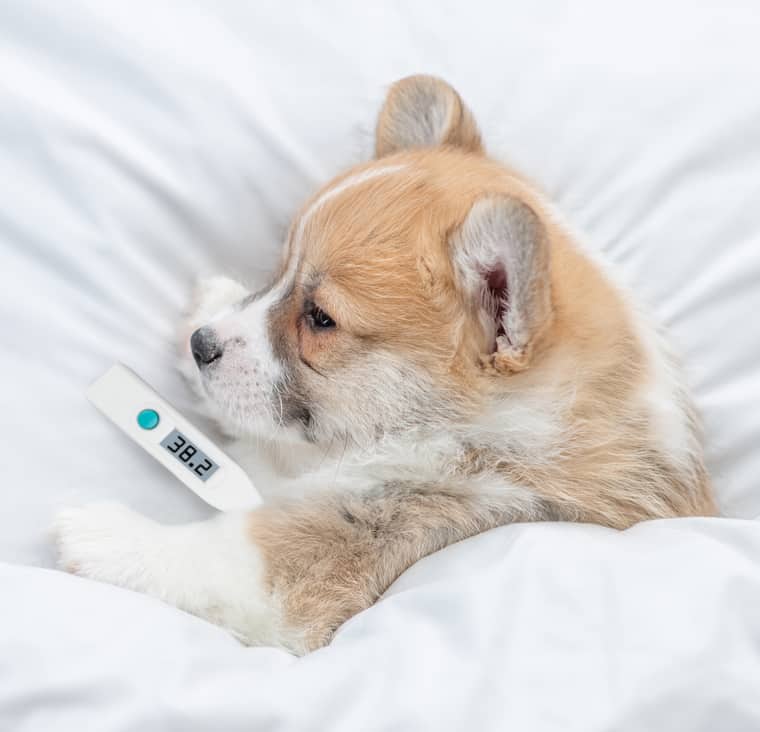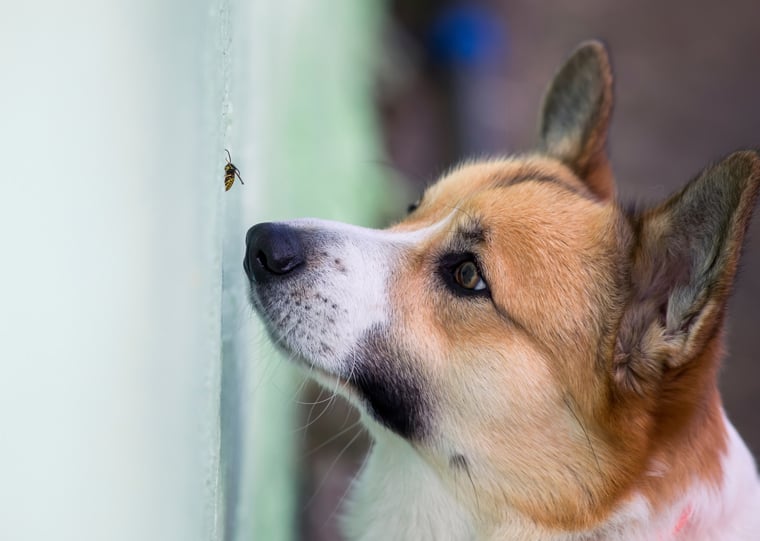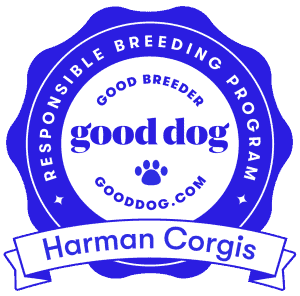First Aid for your dog
It seems that ever since COVID, getting into a veterinarian has been problematic. Your vet may be booked solid and if your pup becomes sick or there is an emergency you may have a hard time getting into your vet. My suggestion is to get to an emergency vet if you have an emergency but if your pup is just a little off watch them closely and collect some data that you can relay to your vet who can hopefully get you in.
First of all, puppies can go downhill very rapidly so don’t wait for days if your little one is sick. Vomiting and diarrhea can cause dehydration very rapidly in a small puppy. These are also both symptoms of deadly Parvo which must be caught and treated early to save the pup.
Taking your pup's temperature
One of the most important tasks you should learn is how to take your dog’s temperature. Normal body temperature for dogs is 100.5 to 102 degrees Fahrenheit. Practice taking your pup’s temperature now. Getting them used to having their temperature taken now will help if there is an emergency later on and will also help with vet checkups. Unfortunately, IR and ear thermometers are not very accurate for taking your dog’s temperature, so you must take it rectally. Some dogs do it best lying down while others prefer to stand. Do what works for you and your dog.
- Purchase a human or baby rapid-read thermometer. Some models will give you results in under 10 seconds. You will also need some lube or Vaseline to prevent discomfort. Place a bit of Vaseline on the tip of the thermometer and insert it into the rectum of the puppy. It may take several attempts but be sure to praise your puppy and give lots of treats once you get the job accomplished.
- Clean the thermometer with rubbing alcohol before storing it.
- If your dog is not feeling well, it is nice to be able to provide a temperature to your veterinarian.
If your puppy is not feeling good, has diarrhea, is not eating, has ingested something, is injured, or has a temperature you need to get them to a vet.

Car Sickness tips
- Try not to drive on hilly, winding roads or make a stop-and-go trip soon after the dog eats. It is better not to feed them than to deal with a car-sick puppy.
- Take short trips to fun places. Do not make trips to the vet the only car trips that your pup takes. Go to Home Depot, Banks, or other puppy-safe stores as described in the safe socialization email a few weeks ago.
- When traveling with a puppy in a crate, give it something to occupy its mind during the trips like a stuffed Kong or cow hoof.
- Cover your puppy’s crate if there is evidence of car sickness.
- If your pet gets sick on a trip, review the hints above and try these options.
- Spray lavender in the car and the crate before the trip or spray Adaptil in the crate or car. You could also put an Adaptil collar on your puppy before the trip and see if it helps.
- Feed your dog a small piece of raw ginger or several ginger snaps 30 minutes before the trip and occasionally during the trip.
- Turn your dog’s crate sideways and cover the crate so the dog cannot see out.

Diarrhea
Soft stools are not uncommon in dogs when they are under stress, have eaten something they should not have, or are ill. Once things begin to go downhill, you need to step in and get your dog’s digestive system back on track quickly! Ignoring diarrhea rarely ends well!
If your dog or puppy is throwing up and has diarrhea, get them to a vet immediately! These are signs of Parvo and your puppy can die quickly if not treated!
When your dog’s stool is soft and unformed like a cow pie or even watery, you need to treat it before dehydration sets in. This is particularly critical in puppies and senior dogs. Other indications of a problem include an increase in stool volume, frequency, urgency, or stools with blood (red) or dried blood (black) or mucus.
- To treat diarrhea in your dog; immediately treat with Imodium AD or Pepto-Bismol.
- Imodium AD should be given by the dog’s weight after each bout of diarrhea to a maximum of 2 times. For dogs under 50 lbs give ½ tablet. Do not exceed the dosage!
- Pepto-Bismol should be given by the dog’s weight at a maximum of 2-3 times daily. If using the liquid give 1 tsp/10 lbs of body weight. If using a tablet give ½ tablet for dogs under 10 lbs, 1 tablet for dogs weighing 10-25 lbs, and 1 ½ if your dog is over 25 lbs. Crush the tablet before giving it to your dog.
- Continue your dog’s normal probiotic at double the normal dosage or if you are not feeding a probiotic add Fortiflora to each meal.
- If the stool remains watery for one day in puppies under five months of age or three days for older animals, make an appointment to see your veterinarian.
If the stool begins to get firmer, continue with the following treatment:
- Continue to feed Fortiflora
- Reintroduce food slowly with small, frequent meals of very mild foods such as boiled rice and chicken or boiled rice and hamburger. Make sure to drain all fat off the meat.
- Feed small meals initially then begin mixing your dog’s normal food back in after a few diarrhea-free days.
Bug Bites and Bee Stings
If your dog is bitten by a bee or bug and its face begins to swell, immediately give it Benadryl even if you are going to the vet. The sooner you get Benadryl into your dog, the less swelling and edema that will occur.

Poison Control Helpline
If your dog eats any chemical or medication immediately contact the 24-hour Animal Poison Control helpline at 855–764-7661 or https://www.petpoisonhelpline.com/.
Time is often critical, so it is best to keep this number in your cell phone.
Getting Pills Down
Training your puppy to take treats now will help later on if your dog has to take pills. The goal is to get the puppy to take a treat which you can wrap around the pill.
- We practice by taking a slice of American cheese, cutting it into 4 pieces and rolling a piece into a ball.
- We then give this treat to the dog.
- When my dogs need to take pills or even monthly dewormers, I simply wrap it in a piece of cheese and give it to the dog. They think that it is just another treat.
Emergencies that require a vet visit ASAP
Emergencies that require a vet visit ASAP
- Your dog eats something poisonous your dog eats a sharp object such as glass
- Your dog gets into a fight
- Your dog gets hit by a car
- Your dog gets a cut that will require stitches
Other things to watch
Other things to watch
- If your puppy or dog has stuffed toys, you should supervise them when playing with these toys.
- They can quickly rip open the toy and eat the stuffing which may cause blockage requiring surgery.
- That is why I suggest flat stuffless toys.
- Watch beds too, the little monsters can quickly rip open a stuffed bed and ingest the stuffing.
- I suggest not buying a nice bed until your puppy is over 1 year of age or buy a Kurunda bed.





